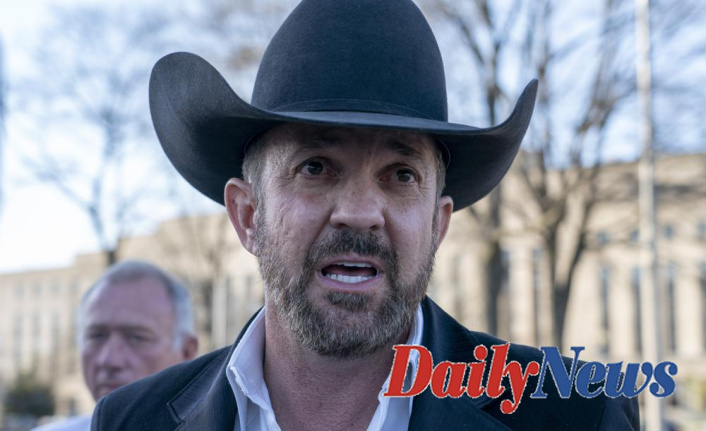U.S. District Judge Trevor McFadden heard testimony on Monday without a jury before deciding a verdict in Otero County Commissioner CouyGriffin 's misdemeanor case. Griffin is a former rodeo rider and helped to found Cowboys for Trump.
McFadden was a nominee for then-President Donald Trump. He said that there was plenty of evidence that Griffin knew he had to stay in a restricted area. Judge McFadden noted that Griffin had to cross three walls and needed help from others or a ladder in order to do so.
McFadden, McFadden stated from the bench that "all of this would suggest to an average person that maybe you shouldn't be entering the area."
The judge said that prosecutors failed to meet their burden of proving that Griffin had engaged in disorderly behavior.
He said, "Arguably, that he was trying calm people down, and not rile them up,"
Griffin's Washington, D.C., trial was the second of hundreds of federal cases that arose from the Jan. 6, 2021, siege. In the first trial earlier this month, a jury convicted Guy Wesley Reffitt of storming Washington, D.C., with a holstered gun, interfering in police proceedings, and obstructing Congress’ joint session to certify that the Electoral College vote was certified.
Griffin's trial may have a ripple effect on other Capitol riot defendants, helping them decide whether they want a judge or jury to decide their cases.
Griffin's case is different from other Jan. 6 cases. It may not be a sign that defendants charged with storming Capitol are in the same boat.
Griffin was one of few riot defendants not accused of entering the Capitol Building or engaging in violent or destructive behavior. His lawyers claimed that Griffin was being selectively prosecuted because of his political views.
Griffin was charged with two misdemeanors, entering and remaining on restricted grounds or buildings and disorderly or disruptive conduct within restricted grounds or buildings. Each of these charges carries a maximum sentence of one year imprisonment.
Griffin is due to be sentenced June 17. Griffin was sentenced on June 17.
Griffin said he was "halfway happy" with the split verdict, and that he will continue to see his participation in Jan. 6's events as "a badge honor."
He told reporters outside the courthouse that he was proud of his current position and the fight he's been involved in over the past year-and-a half.
Griffin is one of three Otero County Commission members in southern New Mexico. He is one of few riot defendants who held public office in the 2 1/2 years preceding the attack or ran for government leadership.
Griffin is one of three riot defendants to have requested a bench trial. This allows judges to decide cases without the involvement of a jury. Griffin stated that he didn't regret giving up his right to a jury trial.
Griffin stated, "If I were anywhere other than Washington, D.C., then I would say, "Go with a jury trial." "If you're a strong conservative like me, you can't get a fair trial in Washington, D.C.
Laurie Levenson, a Loyola Law School professor, said that the conviction for entering restricted ground helps to establish for the government that this area is off limits to the public. This will discourage others from making similar arguments.
Levenson stated that this would send a message that other defendants are unlikely to win on technical arguments that areas outside of the Capitol were not prohibited.
Levenson stated that the verdicts could lead to Griffin-related charges being brought to trial. If they feel the judge who decides their fate is setting a high standard for disorderly conduct, the verdicts may also be used to bring Griffin and other defendants to trial. Levenson stated that the argument would not be helpful for defendants who entered Capitol Building or committed violence on Capitol Ground.
Janani Iyengar, Assistant U.S. attorney, said that Griffin had climbed on metal bike racks and up a plywood ramp to shout over the crowd his belief that Donald Trump stole the election.
She said that he was extremely loud, jumping over barriers and engaging with the crowd in her closing arguments.
Nicholas Smith, defense attorney, said that the case against Griffin was built on "a series of false assumptions" and premises. Smith stated that Griffin visited the Capitol to support free and fair elections.
Griffin's case hinged on whether Griffin entered restricted areas while Vice President Pence was still present at Capitol grounds. This is a crucial question for the U.S. Secret Service in order to infuse access restrictions.
In a court filing, Griffin's lawyers claimed that Pence had left the restricted area prior to the earliest Griffin could enter it. However Lanelle Hawa, Secret Service inspector, testified that Pence did not leave the restricted area during the riot.
Hawa stated that agents removed Pence from his Capitol office to secure a location at the underground loading dock. Hawa testified that Pence remained at the loading dock for approximately four to five hours until Congress resumed its joint session on January 6.
Smith stated that Griffin was believed to have engaged in disorderly conduct after peacefully leading a prayer at the Capitol steps.
Smith stated that Smith was wrong and offensive during his brief opening statements to the judge.
The opening statements of the prosecution were not made. Matthew Struck was their first witness. He was Griffin's videographer and joined Griffin at Capitol. Struck has an immunity agreement with the prosecutors to testify.
According to prosecutors, Griffin and Struck entered a stage on the Capitol's Lower West Terrace that was being built for Biden's inauguration after they had attended Trump’s "Stop the Steal” rally on January 6.
Prosecutors showed video clips of Griffin moving through the mob outside the Capitol. Police used pepper spray to stop the rioters.
Griffin stated, "I love the scent of napalm in your air," a reference to an expression from "Apocalypse Now"
Griffin, after climbing over a stone wall to enter a restricted area of the Capitol, said that "This is our home... we should all have arms." According to prosecutors. Griffin called it "a great moment for America" and said, "The people have had enough."
Prosecutors called Griffin an "inflammatory provocateur" and "fabulist" in a court filing. They also stated that Griffin engages in racist invective, and propagates baseless conspiracy theories such as the claim that Communist China stole 2020's Presidential Election.
Griffin's lawyers claim that hundreds, if not thousands, of people did exactly the same thing Griffin did Jan. 6, and they haven't been accused of any crime.
Federal crimes related to the Capitol Riot have been brought against more than 770 individuals. More than 230 of the riot defendants pleaded guilty to misdemeanors and at least 127 have been sentenced. Another 100 are awaiting trial.
Griffin had promised to ride horseback to the courthouse Monday morning. Griffin arrived instead as a passenger in a pickup truck with a horse trailer at the back.












